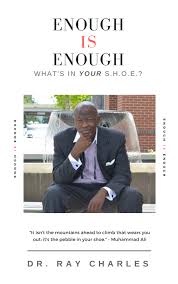Video courtesy of Ray Charles
 At times in your life, you may feel like you’re in a rut. You’ve got a great job, attained a degree or two, but something is holding you back from reaching your real God-given purpose. For some reason, you just don’t feel fulfilled. Maybe you’ve tried to read self-help books or be inspired by successful business leaders in the past but nothing has spoken to you spiritually. Dr. Ray Charles may have the roadmap you need to make a lasting, meaningful, and righteous change. In his book “Enough IS Enough: What’s in Your S.H.O.E.?,” Dr. Charles openly shares how he overcame his own personal and professional struggles and outlines a method that takes readers on a journey of looking inward and authentically about themselves and what pebbles are hindering their success.
At times in your life, you may feel like you’re in a rut. You’ve got a great job, attained a degree or two, but something is holding you back from reaching your real God-given purpose. For some reason, you just don’t feel fulfilled. Maybe you’ve tried to read self-help books or be inspired by successful business leaders in the past but nothing has spoken to you spiritually. Dr. Ray Charles may have the roadmap you need to make a lasting, meaningful, and righteous change. In his book “Enough IS Enough: What’s in Your S.H.O.E.?,” Dr. Charles openly shares how he overcame his own personal and professional struggles and outlines a method that takes readers on a journey of looking inward and authentically about themselves and what pebbles are hindering their success.
UF: When you’re doing all the things that you were told to do — you go to school, you get your degree, and you work hard — what is the missing piece that keeps people from feeing fulfilled?
DC: I’m going to share with you something that I don’t believe I shared in my book. My best friend was a two-time Super Bowl champ — Chicago Bears and the New York Giants. After the N.F.L., he decided to enroll in the Harvard Executive M.B.A. program. He aced that program. Then, he took a company from $5 million in Milwaukee, Wisconsin, to 65 million in five years. He had the “Midas Touch,” everything he touched turned into gold. And then he hit a precipitous fall. The business took a turn. He committed suicide. He had C.T.E., which is the concussion the player had in the Will Smith movie (Concussion 2015). The gentleman reached for a gun and the movie ended and everyone knew that it was suicide. That was my best friend Dave Duerson. Why did I share that story? It’s because he had one of the highest IQs that I know of. Just through the roof. He knew his business acumen. When the pain came and when the storm came, what he tried to reach for didn’t necessarily sustain. College prepares you for the “what” but not the “who.” So companies have a business plan, a marketing plan, a strategic plan, a sales plan, and all of the other plans. But college doesn’t prepare you for a personal plan. So how do you navigate your way when you hit the bumps in the road? Most of us tend to look at things external to combat those bumps, when in fact it’s not external, it’s internal. And that’s what the “who” is.
UF: Is there a particularly emotional intelligence issue that people have difficulty getting over? Something that you see more often than others?
DC: I think what people have difficulty getting over is the depth. Because in order to get to the “who” it goes through the cross. You gotta go through Calvary to get to the “who”. People don’t want to give that up. In order to get to the “who,” you’ve got to get out of your comfort zone.
U.C.L.A. did a research study that shows leadership success comes down to two things — intellect and how do people feel when they experience you. It doesn’t necessarily have to be physically entering the room. It could be, how do people feel when your name shows up in someone’s email inbox? So according to this research, 93% of leadership success depends on how people feel. People have to experience the authentic you that was designed by God. It has to be a pursuit of, “What is my divine purpose?” When I come to terms with that, and when I walk into a room, it’s going to cause a certain sense of joy and peace, gladness and engagement. Most folks spend their time going after the 7%, which is the intellect. So we have leaders of nations and businesses, very smart people who are suffering.
UF: In your book, you talk about what has hindered your success both personally and professionally. How were you able to make a successful shift in your life?
DC: I was arrogant. I changed when I saw right before my eyes a mirror of who I was. But after that change was a transition. The event was the change. I went on an “in-venture” — an internal adventure. I went on that In-venture to discover, “Ok, how do I get out of this? How do I make this habitual? How do I make this a lifestyle?” I thought I was confident. My wife was like, oh, no brother you are arrogant — and then my fraternity brothers validated that. I was like, okay, I get it. I get it. How do I change? Show me the proof of change and the proof came in the Word. That was the event. Change is external, but transition is internal. The transition, that journey, is what S.H.O.E. is about. I’m taking folks through a journey, but change happens in an instant.

I read the article in the Urban Faith magazine. I would like to know if UMI sales this book?
No, but it is on Amazon.